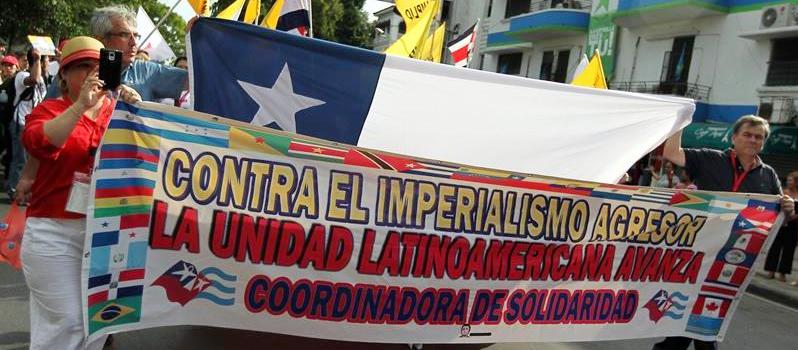
|
April
11,
2015
Supplement No to U.S. Striving to Dominate
Latin America and the Caribbean!
|
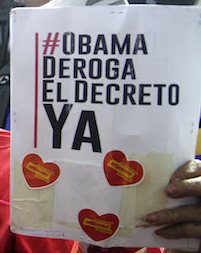 Placard at People's Summit demands Obama rescind his decree against Venezuela. |
Ecuadorian Foreign Minister Ricardo Patino pointed out on March 25 that the U.S. government has budgeted U.S.$1.9 billion in 2016 for the promotion of so-called freedom of the press in Cuba, Venezuela, Ecuador and Nicaragua, amongst other unsavoury activities. Patino insisted that the U.S. stop making such "ridiculous proposals" if it wants to have a "friendly" Summit of the Americas.
The hostility toward the anti-Venezuela decree indicates that the hidebound U.S. imperialists have clearly not learned the lesson from the sharp rebuke they received in 2009, when attempts to isolate Cuba utterly backfired and the 1962 resolution expelling Cuba from the OAS was overturned. While Cuba has warmly welcomed the broad support represented by the rescinding of the 1962 resolution, it has repeatedly made clear that it considers the OAS fundamentally flawed and that it will not return to the body. Instead it will be putting its weight behind other regional bodies that genuinely defend the interests of the countries of Latin America and the Caribbean. While it will participate in the meeting of heads of state at the Summit, as well as four parallel forums for social, youth, business and university sectors, it will not retake its seat in the OAS.
Prensa Latina reports that the OAS has given credentials to figures from different Cuban and Venezuelan anti-government groupings financed by the United States and inserted by Washington and the OAS as part of the designated civil society component of the Summit. Some two dozen Cuban counterrevolutionaries (residents in Cuba and abroad and financed from abroad) are authorized to participate in the social forum, while others are likely included in other U.S. NGOs opposed to Cuba. Organizations such as the Hostosian National Independentist Movement of Puerto Rico, as well as environmental groups, trade unions, the Cuban delegation to the Civil Society Forum and other groups were not given standing.
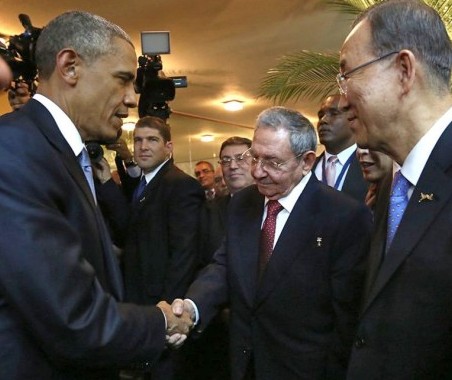 Cuban President Raúl Castro shakes hands with U.S. President Obama. Cuba's presence at the OAS is a great achievement, a product of the region's unanimous demand that Cuba be included. |
Canadians should be vigilant of developments at the Summit of the Americas, not only being at the ready to defend the sovereignty of all countries from U.S. imperialism, but also to reject any Canadian support for U.S. imperialist intrigues.
Prime Minister Stephen Harper has expressed a desire to meet with Cuban President Raúl Castro during the Summit, although in 2012, the U.S. and Canada were the only two OAS members to oppose Cuba's participation in the 2015 Summit. Harper, notorious for his virulent anti-communism, did not say what he might speak about with President Castro. Under the Harper government, Canada has gained notoriety for the provocative, uncouth and undiplomatic manner in which the Prime Minister and former Foreign Minister John Baird have conducted themselves in international fora.
In recent years, the rise of the Community of Latin American and Caribbean States (CELAC), has signalled the end of the OAS, with various governments referring to it as an unburied corpse. Faced with an agenda it cannot control, it seems that the U.S. and its lackey Canada are trying to sabotage the Summit. Already, reports are emerging that even before the Summit began, Canada and the U.S. colluded to block a final statement for the Summit from being issued.
Under the Harper government, Canada's servility to monopoly right and U.S. imperialist interests in Latin America and the Caribbean has only intensified. Canadians must reject the Harperites' humiliation of Canada as a toady of U.S. imperialism.
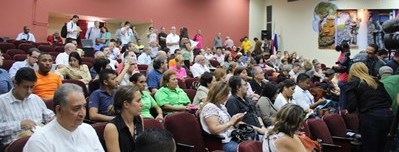
Press conference held by Cuban delegation to OAS Summit, April 8, 2015.
(With files from Prensa Latina, TeleSUR, CP; Photos I. Francisco, CubaDebate.)
U.S. and Canada Obstruct Final Declaration
Argentine Foreign Minister Hector Timerman confirmed on April 8 that the Summit of the Americas taking place in Panama April 10-11 will not issue a final declaration due to opposition from Canada and the United States.
"There was no agreement on several points and as a result this Summit will not have a final document," said Timerman, adding that he considered it a "shame."
The lack of a final declaration, which is customary during these summits, is attributed specifically to the intransigence of representatives from the United States and Canada who opposed certain clauses contained within the draft.
Argentine news outlet Telam confirmed that the clauses in the draft document that made references to the strengthening of collective rights, as well as those that called on states to have greater obligations, were opposed by the U.S. and Canada.
Timerman, who sits on the Summit Implementation Review Group, said that Argentina argued that the differences should have been debated by the heads of state, but instead the debate was centered around whether there would be a final declaration or not.
The last Summit of the Americas, held in Colombia in 2012, also did not issue a final declaration.
Timerman also reiterated Argentina's call for the U.S. decree against Venezuela to be repealed. "We oppose the interference of foreign countries in the internal affairs of other countries," said Timerman.
He added that the U.S. failed to send a representative to the meeting of foreign ministers, which precedes the opening of the Summit.
(TeleSUR)
The OAS' Fraud of "Civil Society"
The Organization of American States (OAS) organized a so-called Hemispheric Civil Society and Social Actors side forum as part of the Summit of the Americas.
The Latin American Herald Tribune describes the Civil Society Forum as follows: "The event brings together more than 800 civil society organizations from 30 countries in the region, which will hold discussions from [April 9 to 10] with the objective of providing inputs to the 35 Heads of State and Government of the Hemisphere, invited to the Summit. The inaugural day of the event also included a speech by the former U.S. President Bill Clinton. [...] The Civil Society and Social Actors Forum aims to promote consultation and coordination mechanisms, dialogue and exchange that include the participation of the civil society organizations and social actors of the hemisphere. The forum will offer its input and recommendations for the consideration of the participating States during the 'Mandates of Action' negotiations of the Seventh Summit of the Americas."
The Civil Society Forum demonstrates the fundamental nature of the OAS as an instrument of U.S. imperialism in the Americas. Firstly, the concept of "civil society" promoted by the OAS is intended to disempower the people and ensure they are sidelined from actual decision-making power by neo-liberal governments that serve the monopolies.
Secondly, the Forum is a means to provide accreditation and standing at the Summit to various terrorist and counterrevolutionary individuals and organizations.
For example, terrorist Félix Rodríguez Mendigutía, one of those directly involved in the CIA-ordered execution of Che Guevara in Bolivia, is to meet with a group of accredited mercenaries also participating in the Forum. Rodríguez also participated in the U.S. failed invasion of Cuba at Playa Girón as a member of the 2506th brigade, was involved in the arms and drug trafficking operations supporting the Nicaraguan counterrevolution which blew up in the "Iran-Contra" scandal, and attacked civilian boats bringing goods to Cuba, Prensa Latina informs. The attendance of Rodriguez was strenuously opposed by the Cuban delegation.
Another example is the presence of the group known as the Cuban Democratic Directorate (DDC) with links to terrorism, as well as the Democrat Organization of America (CADO), Cuban counterrevolutionaries whose aim is to undertake provocative actions against the Cuban delegation to Panama. Such groups are unfailingly backed by the U.S. imperialists.
Another indication of the illegitimacy of the Civil Society Forum is that the Cuban delegation did not receive accreditation to participate, while at least 20 counterrevolutionaries were provided with accreditation, TeleSUR reports, adding that the parallel forums include reactionary individuals and organizations that oppose the policies of the progressive governments in the Americas. The Workers' Central Union of Cuba (CTC) was also blocked from participating, as was Puerto Rico's Hostosian National Independentist Movement.
Consequently, the Cuban and Venezuelan delegations withdrew from the Forum in protest because of Cuba's exclusion and the inclusion of the reactionary individuals and organizations.
Cuba's exclusion from the Forum is surely unjust and must be denounced. However, there should be no illusions about what the OAS represents and which country controls it.
Cuba's democracy does not divide up the polity into the governed -- "civil society" -- and those who govern. It is the social responsibility of all Cubans to be involved in governance and decision-making in the society. The Cuban Revolution's empowerment of the people is anathema to the OAS and U.S. imperialist aims for the Americas.
The intrigues at the Civil Society Forum underscore that the U.S. aim for Cuba is still one of domination and regime change, only now using new methods since the old ones clearly failed. Official Cuban delegations have been permitted for the high level meetings, with counterrevolutionaries and so-called dissidents present at other meetings to undermine Cuba's presence and give a distorted picture of the country to put pressure on Cuba with bogus accusations of human rights violations.
Ultimately, the attempt to isolate Cuba using the Civil
Society Forum will
only succeed in further demonstrating the irredeemable and illegitimate
nature
of the OAS.
Citizen Participation in the Panama Forum:
"There Was No Roundtable, There Is Denunciation"
Statement of principles of the civil society gathered in the Roundtable Debate on Citizen Participation at the Civil Society and Social Actors Forum of the 7th Summit of the Americas
Civil society representatives and social actors from Ecuador, Nicaragua, El Salvador, Panama, Mexico, Colombia, Venezuela, Cuba and Chile, gathered for the Roundtable Debate on Citizen Participation at the Forum of Civil Society and Social Actors, in the presence of the facilitators assigned by the Organizing Committee, Maribel Jae from Panama and Jorge Arguindegui of Argentina, following a harmonious discussion resolve to:
- Denounce the non accreditation of several Latin American civil society representatives who previously applied and were accepted.
- Condemn the complicity of the Organizing Committee in facilitating the gathering of illegitimate individuals, historic enemies of popular causes, who intend to set themselves up as representatives of a civil society that repudiates them and who left the official space of the roundtable, and did not wait to allow for all participating civil society representatives to be accredited. They do not represent our peoples.
- Demand the accreditation of social actors and members of civil society that have not been accredited, as well as condemning the insult of assembling a parallel forum
- Declare that the Roundtable Debate on Citizen Participation in the Forum of Civil Society and Social Actors was not installed in the official space, in the presence of the facilitators of the event so designated by the organizers.
- Reject the attempted aggression against compañeros of the delegation from Ecuador by César Ricaurte, from Funda Medios, a NGO funded by USAID, which promotes a coup d'état in Ecuador.
- Demand that the event organizers declare the attempt to install a parallel roundtable to disregard the true representation of civil society and social actors of our America as illegitimate.
- Proclaim our firm decision to build our united, independent and sovereign America, with such powerful integration mechanisms as CELAC.
- Thank the facilitators assigned by the Organizing Committee for their support in the Hall.
Announced in the Cristal Hall of the Hotel El Panama, on April 9, 2015.
(With files from Granma International, Latin American Herald Tribune, Prensa Latina, TeleSUR, Mariano Álvarez)
People's Summit Underway
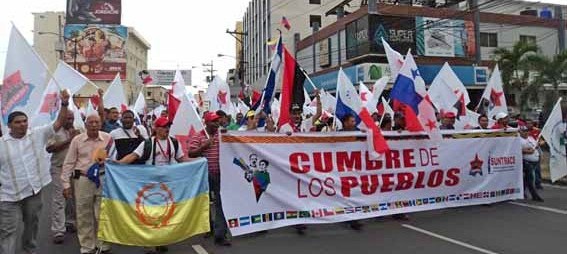
March on the opening day of the People's Summit.
Close to 2,000 representatives of social movements from across the hemisphere convened the People' Summit in Panama on April 9 to discuss issues ranging from U.S. sanctions on Venezuela to Puerto Rican independence. The four day People's Summit, which runs concurrently with the Summit of the Americas, is taking place in the University of Panama, under the slogan, "Latin America -- a homeland for all, with peace, solidarity and social justice."
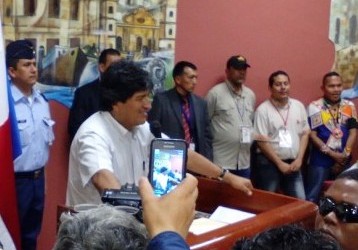 Bolivian President Evo Morales at the People's Summit. |
Labour unions, feminists, environmentalists, student groups and other social movements are participating. The People's Summit is hosting workshops and presentations on 15 different topics, including the threat to peace in the region posed by the United States, the fight to end the economic blockade against Cuba, Bolivia's need for access to the sea, and reparations for civilian victims of the 1989 U.S. invasion of Panama. Ecuador's President Rafael Correa has confirmed plans to attend the People's Summit, while Bolivian President Evo Morales gave the keynote address on April 10.
Morales said the United States has been one of the most serious threats to Bolivia's national security, and his own presidency. "Where there is a U.S. embassy, there are coups," Morales said. The president alleged the U.S. government has been plotting to overthrow him for years. "The [Bolivian] right-wing, the opposition and the U.S. ambassador have always conspired ... against the [revolutionary] process," he said. However, he said regional initiatives aimed at promoting Latin American solidarity are the region's best defence against U.S. imperialism. "I think actually the member countries of the Community of Latin American and Caribbean States, are a threat to the neo-liberal transnationals. But they will never be a threat to U.S. security," he said.
The Summit's organizer, union leader Olmedo Beluche,
says the
participants will submit a joint declaration of proposals to regional
leaders,
with the aim of promoting stronger lines of communication between
governments and social movements. In a statement, organizers said the
Summit
is a forum for "the voice of our peoples, to highlight problems the
other
meeting (the Summit of the Americas) doesn't address."
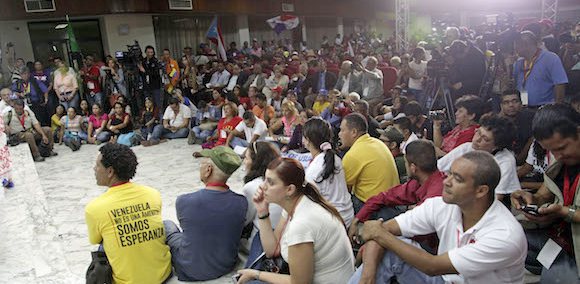
Gilberto Ríos, Coordinator of the Honduras Popular Resistance International Commission, told TeleSUR why his organization is attending the People's Summit: "We are travelling to Panama as a delegation of the social movements and political organizations that are part of the leadership of the National Front of Popular Resistance in order to express our solidarity with Cuba as it tries to normalize its diplomatic relations with the United States. Also we are going to show our support for Venezuela and the issue of threats that the decree by Obama represents."
The Summit also commemorates ten years since the
meeting in Mar del
Plata, Argentina when Latin American countries put an end to President
George Bush's intentions to create a free trade area under the control
of the
United States. Countries agreed then to develop a more fair and
solidarity-based trade initiative like ALBA, the Bolivarian Alliance
for the Peoples of
Our America.
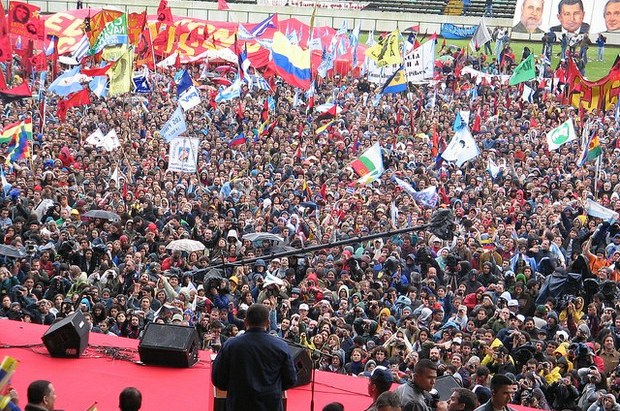
Hugo Chávez speaking to the People's Summit held at the same time as the OAS Summit,
Nov 4-5, 2005, at Mar Del Plata, Argentina, stated "The Latin American people buried the FTAA, today, here in Mar del Plata."
The Mar del Plata meeting was the turning point marking when the United States' almost complete control over the region broke, writes TeleSUR. Argentina, Brazil, Ecuador and Bolivia began building a new political and economic process in South America following the example of Venezuela.
"In Mar del Plata ten years ago it was demonstrated that the popular hegemony of the socialist and progressive governments of Latin America could defeat the United States' hegemony and build an alternative option led by President Hugo Chávez that showed that with creativity and an alliance of the people, imperialism could be defeated," added Rios.
Youth movements are also participating in the People's
Summit and were
part of the international campaign to get the more than 13 million
signatures
in support of Venezuela brought to the Summit of the Americas. "This
activity
that we have in the National Autonomous University of Honduras, the
biggest
in the country, is to give information about what's going on in
Venezuela and
especially the media campaign and the economic attacks that the United
States
is coordinating against Venezuela," explained Grecia Lozano,
Coordinator of
the Youth of the Libre Party in Honduras.
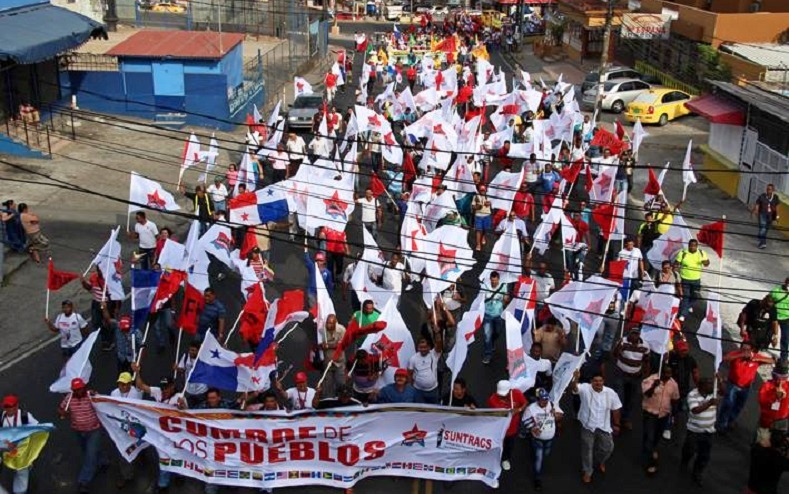
(TeleSur. Photos: I Franscisco, TeleSUR)
Cuba's Chair at OAS Will Remain Empty
Fifty-three years ago, the Organization of American States (OAS) expelled Cuba under the pressure of Washington, and although in 2009 the organization changed its decision, Cuba maintains its firm stance not to return to the OAS, an issue that now surfaces with the approach of the Summit of the Americas.
Cuba has many reasons to reject going back to the OAS, but they can be summarized just by recalling the role played by that organization for decades by acting as a platform of Washington to attack, occupy and exploit Latin American and Caribbean countries.
For this reason, Cuban diplomat Raul Roa, known as the Chancellor of Dignity, described the OAS as the Ministry of U.S. Colonies. Roa, an outstanding politician and intellectual, defended Cuba for years at the United Nations and died in 1982.
The OAS was created in 1948 during the International American Conference held in Bogota, Colombia. One of its first steps was to approve a resolution supporting what it called regional collective intervention in Guatemala in 1954.
Such mercenary aggression, designed by Washington, was aimed at overthrowing the Jacobo Arbenz government and putting an end to the so-called Democratic Spring, under which the Arbenz government adopted a land reform and other measures that benefited its people.
With the consent and silence of the OAS, Cuban cities were bombed in the first years of the Revolution, and the 1961 Bay of Pigs mercenary invasion was orchestrated by the U.S. administration.
And on January 3, 1962, the United States broke relations with Cuba; that same month the OAS passed a resolution excluding the island from the inter-American system of nations.
The harmful role played by the OAS makes a long story.
The White House managed to have the OAS adopt, by a narrow margin, a resolution allowing an intervention in the Dominican Republic in 1965 to prevent the victory of the Constitutional People's Movement, and with the OAS' complicity or approval, the United States invaded tiny Grenada in 1983 and Panama in 1989.
The OAS really has a long record of dirty actions over the past 60 years, which can be considered a betrayal of the nations of Latin America, said leader of the Cuban Revolution Fidel Castro in one of his articles published in 2009.
In June 2009, the OAS General Assembly, held in Pedro Sula, Honduras, decided to put down the shameful resolution that expelled Cuba in 1962. Nearly forty years had passed when it happened, but the Latin American and Caribbean scene is now different, given the existence in the region of governments more committed to their people and with a far-reaching concept of independence.
The Cuban government said that the accord reached at the Honduras meeting was an unquestionable affront to the policy followed by the United States against Cuba since 1959. However, Havana ratified its position not to return to the OAS, which backed the hostile policy implemented by Washington, approved the U.S. economic blockade of the island and stipulated that OAS member nations should break relations with Cuba.
Now, this issue comes to the surface as the Seventh Summit of the Americas is to be held April 10 and 11 in Panama, in which Cuba will be present for the first time. However, the Cuban position remains the same. The island is now betting on new regional integration mechanisms, such as the Bolivarian Alliance for the Peoples of Our Americas (ALBA); the Union of South American Nations (UNASUR) and the Community of Latin American and Caribbean States (CELAC).
Strengthening, expanding and finding harmony among those blocs is the road that Cuba has chosen, instead of the illusion of returning to an organization that does not allow any reforms and that has already been sentenced by history. Cuba's chair at the OAS will remain empty.
(Cuba News Agency, April 2, 2015. English version of Prensa Latina Spanish original. Grammar slightly edited by TML for publication.)
U.S. Hypocrisy on Human Rights in Latin America
and the
Caribbean
On April 5, TeleSUR published an editorial entitled "Americas Summit at a Turning Point" about the Organization of American States' (OAS) Seventh Summit of the Americas. Posted below is an excerpt from that item regarding how the U.S. wields the human rights issue as a weapon in its hostile relations with countries of the region such as Venezuela.
***
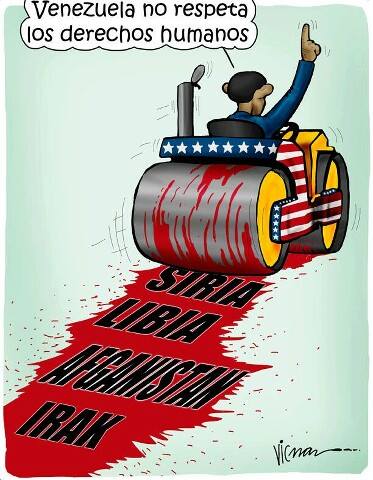 [...] The OAS as an
institution depends largely on U.S.
funding, which contributes 59 percent of its "regular budget;" another
12
percent comes from Canada, leaving just 29 percent from the Latin
American
nations, despite the fact Latin Americans comprise the overwhelming
majority
of the 900 million people represented by the OAS.
[...] The OAS as an
institution depends largely on U.S.
funding, which contributes 59 percent of its "regular budget;" another
12
percent comes from Canada, leaving just 29 percent from the Latin
American
nations, despite the fact Latin Americans comprise the overwhelming
majority
of the 900 million people represented by the OAS.
Private donors, institutions and nongovernmental organizations cover 13 percent of the OAS total budget, which, in addition to the regular budget, includes a "Special Fund."
One such recipient of this external funding is the Inter-American Commission of Human Rights (IACHR), an OAS body controversial for its proactive and continued criticism of governments such as Ecuador, Venezuela, and Bolivia.
Although the OAS is funded by its member states, the body's specialized commissions can be funded by countries and/or non-governmental organizations as well as private donors.
Funding of [IACHR] is highly skewed to external sources. Fifty-six percent of its money comes from "special" funding according to a 2013 IACHR report. Of that figure, half comes from the U.S. and Canada (41 percent and 10 percent respectively), with European nations committing 31 percent and non-governmental organizations adding 3 percent. Latin American nations contribute only a small proportion.
Despite the high proportion of U.S. funding, the fact the IACHR has its headquarters in Washington, and despite its commissioner being a U.S. citizen, the United States itself is effectively absolved of the body's rules, because it has not ratified the American Convention of Human Rights, which guides the IACHR's stance on human rights.
As Ecuador's President Correa asked in January 2015 at the summit of the [Community of Latin American and Caribbean States], "How is it that the IACHR headquarters are in Washington: they have not ratified the Inter-American Charter of Human Rights?" He added, while the U.S. has not signed on to international conventions, it has "established the Commission and the Commission finances to control others." A month earlier, Correa had noted that the IACHR had not bothered looking into allegations of CIA torture.
One of the most active bodies within the IACHR has been the Special Rapporteur for Freedom of Expression, which has constantly opposed media laws throughout the region. It has also led charges against the governments of Argentina, Venezuela, Bolivia, Ecuador and Nicaragua. This body receives almost 30 percent of the Inter-American Commission of Human Rights' total funding. Meanwhile, the Office for Economic, Cultural and Social Rights of the IACHR receives barely 3 percent.
As a result of the politicization of the human rights debates in 2013, Argentina, Bolivia, Ecuador Guatemala, Nicaragua, and Venezuela backed a motion calling for the IACHR's headquarters to be moved to a signatory state of the American Convention on Human Rights.
Given this hypocrisy, Venezuela has withdrawn from the American Convention on Human Rights. Ecuador and Bolivia, among others, have suggested they may take similar measures without substantial reform.
Furthermore, many critics have pointed out the inherent contradiction of the IACHR speaking out against modern-day Latin American democracies in a way it did not during South America's bloody military dictatorships. It took the IACHR until November 2014 to finally request that Latin American governments repeal amnesty laws that gave impunity to the military after the 1980s.
[...]
Obama's Trip to Caribbean Seeks to Undermine Regional Solidarity, Integration and Energy Security
On April 8, just prior to the Organization of American States' Seventh Summit of the Americas, U.S. President Barack Obama travelled to Jamaica as part of an ongoing effort to persuade that country and other Caribbean nations to break away from PetroCaribe, the bilateral program established by Venezuela in 2005 in which subsidized oil is provided to other countries to assist with development and raise the overall standard of living in the region.
Venezuelanalysis.com writes, "As the first active U.S. president to visit Jamaica in 33 years, the primary goal of Mr. Obama's trip will be to develop, in coordination with the World Bank, an investment plan in the Caribbean's energy sector."
Venezuela, as an OPEC signatory is not permitted to undercut market prices of oil. However, through PetroCaribe, various Caribbean countries purchase oil from Venezuela on conditions of preferential payment -- at a fraction of market value -- with the remaining cost converted into long term, low interest loans. When market prices rise above a certain level, participating countries receive discounts of 40 to 50 per cent that accrue as 25-year one per cent interest loans. Payment is not necessarily financial, as in the case of Cuba, which sends its medical, educational and other humanitarian brigades to Venezuela in return. PetroCaribe arrangements are carried out only on a state-to-state basis, meaning that private oil monopolies are cut out as intermediaries and greater sovereignty over national economies is facilitated. Venezuela now provides more than 250,000 barrels of oil a day to 18 Central American and Caribbean countries, ensuring energy security for more than 40 per cent of the region.
As a recent example, this April, "the Bolivarian government, through the PetroCaribe initiative, donated U.S.$16 million to help the government of St. Kitts and Nevis provide for former sugar industry workers," writes Venezuelanalysis.com.
Obama's discussion about energy while in the Caribbean is part of economic aggression against countries that it considers a threat to its plans for world domination, especially Venezuela, Iran and Russia. As has been pointed out in TML, the U.S. and its allies like Canada have stepped up oil production from tar sands and fracking to deliberately depress the value of oil, which in turn affects PetroCaribe.
In March, U.S. Secretary of State John Kerry warned of "strategic damage" to Venezuela which could cause "a serious humanitarian crisis in our region." This was followed by disinformation published by the Miami Herald to sow doubt in PetroCaribe. Venezuelan Foreign Affairs Minister Delcy Rodriguez stated that the report is false and is part of a concerted effort to discredit PetroCaribe.
Obama's visit to the Caribbean is also a follow up to the "Energy Summit" called by U.S. Vice President Joe Biden on January 25 in Washington, DC, to which 14 leaders of the Caribbean Community (CARICOM) countries and the Dominican Republic, were summoned. The Summit was purported to be about seeking clean energy solutions. However, the focus of the event was less about environmentalism and more about breaking away from PetroCaribe, writes Venezuelanalysis.com.
While the U.S. carries out all manner of interference and blackmail against the peoples of the Americas, Biden arrogantly and hypocritically slandered the vital programs PetroCaribe enables, saying, "[N]o country should be able to use natural resources as a tool of coercion against any other country." Pointedly, the U.S. made no official commitments to provide the financial resources required by the Caribbean nations to develop their energy sectors at the Summit. Instead, Biden presented the "choice" that the U.S. is providing them -- to contract directly with U.S.-based private monopolies to meet their energy needs rather than PetroCaribe.
(With files from TML, Venezuelanalysis.com, Jamaica Observer)
Obama's Legacy Set to Fail in Latin America
Obama opened the door to Cuba, admitting Washington's half century of failed foreign policy towards the island, but then shut it on Venezuela, implementing policies that are set to end in a similar way.
As Latin America prepares for the upcoming Summit of the Americas in Panama City on April 9-10, the big elephant in the room is not going to be the long awaited reunion of Cuba with the organization, from which it was excluded over fifty years ago under U.S. pressure, but rather President Obama's latest act of aggression against Venezuela.
The entire region has unanimously rejected Obama's Executive Order issued March 9, 2015, declaring Venezuela "an unusual and extraordinary threat to U.S. national security and foreign policy" and has called on the U.S. president to rescind his decree.
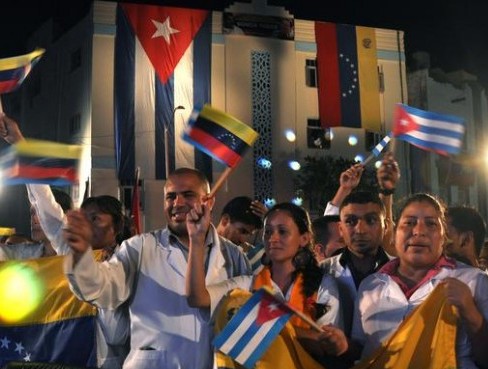 Solidarity with Venezuela concert, Havana, Cuba, March 15, 2015 |
In an unprecedented statement on March 26, 2015, all 33 members of the Community of Latin American and Caribbean States (CELAC), which represents the entire region, expressed opposition to U.S. government sanctions against Venezuelan officials, referring to them as "the application of unilateral coercive measures contrary to International Law."
The statement went on to manifest CELAC's "rejection of the Executive Order issued by the Government of the United States of America on March 9, 2015," and its consideration "that this Executive Order should be reversed."
Even staunch U.S. allies such as Colombia and Mexico signed onto the CELAC statement, along with U.S.-economically dependent Caribbean states Barbados and Trinidad, amongst others. This may be the first time in contemporary history that all Latin American and Caribbean nations have rejected a U.S. policy in the region, since the unilateral U.S. blockade against Cuba.
Ironically, President Obama's justification to thaw relations with Cuba, announced in a simultaneous broadcast with President Raúl Castro on December 17, 2014, was primarily based on what he called Washington's "failed policy" towards the Caribbean island.
More than fifty years of unilateral sanctions and political hostility had only served to isolate the U.S. internationally, while Cuba strengthened its own relations with most countries around the world and gained international recognition for its humanitarian assistance and solidarity with sister nations.
Almost without pause, Obama opened the door to Cuba, admitting Washington's failure, and then shut it on Venezuela, implementing an almost identical policy of unilateral sanctions, political hostility and false accusations of threats to U.S. national security. Before the region even had time to celebrate the loosening of the noose around Cuba's neck, it was tightened on Venezuela's.
Why, the region wondered, would President Obama impose a proven failed policy against another nation in the hemisphere, especially during a period of renewed relations?
Considering the ongoing U.S. war on terrorism that qualifies any alleged threat to U.S. security, by anyone or anywhere, to be a viable target of its vast military power, Venezuela was not about to sit quiet in the face of imminent attack. The South American nation immediately launched an international campaign to denounce Obama's Executive Order as an act of aggression against a country that poses it no real threat.
President Nicolás Maduro published an Open Letter
to the
People of the
United States in the March 17, 2015 edition of the New York Times
alerting
readers to the dangerous steps the Obama administration was taking
against a
peaceful, non-threatening neighboring state. The letter urged U.S.
citizens to
join calls for Obama to retract his Executive Order and lift the
sanctions
against Venezuelan officials.
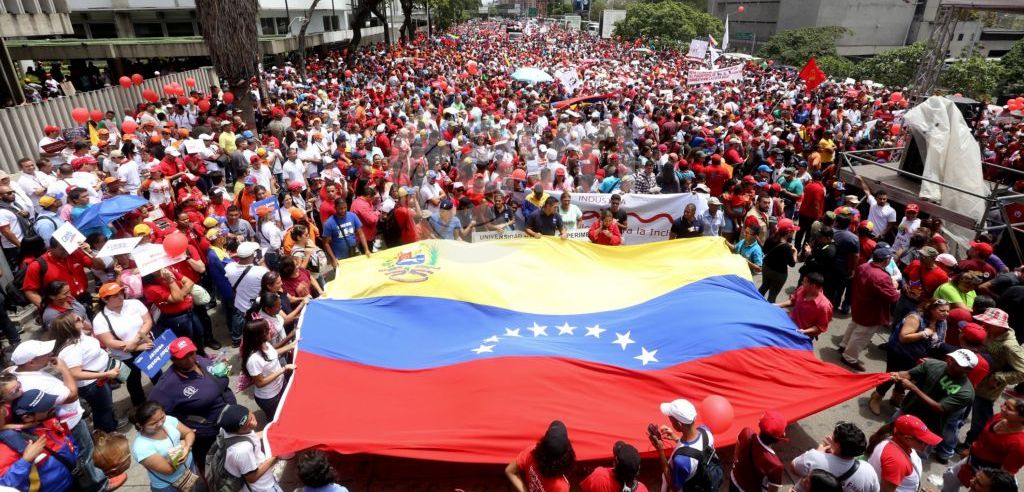
Anti-imperialist march in Caracas, Venezuela, March 15, 2015.
The region reacted quickly. Just 48 hours before Obama's Executive Order was issued, a delegation of Foreign Ministers from the Union of South American Nations (UNASUR), representing all twelve South American countries, had traveled to Venezuela to meet with government officials, opposition representatives and members of civil society. UNASUR had been mediating dialogue between the government and opposition since anti-government protests erupted last year and caused over 40 deaths in the country and widespread instability. The fact that Obama's decree came right after UNASUR had reignited mediation efforts in Venezuela was perceived as an offensive disregard of Latin America's capacity to resolve its own problems. Now the U.S. had stepped in to impose its will. UNASUR responded with a scathing rejection of Obama's Executive Order and demanded its immediate abolition.
Additionally, countries issued individual statements rejecting Washington's sanctions against Venezuela and its designation of the South American country as an "unusual and extraordinary threat" to its national security. Argentina considered it "implausible to any moderately informed person that Venezuela or any country in South America or Latin America could possibly be considered a threat to the national security of the United States," and President Cristina Fernandez made clear that any attempt to destabilize Venezuela would be viewed as an attack on Argentina as well. Bolivian President Evo Morales expressed full support for President Maduro and his government and lashed out at Washington, "These undemocratic actions of President Barack Obama threaten the peace and security of all countries in Latin America and the Caribbean."
Ecuadorian President Rafael Correa tweeted that the Obama Decree must be a "bad joke," recalling how such an outrageous action, "reminds us of the darkest hours of our Latin America, when we received invasions and dictatorships imposed by imperialism...Will they understand that Latin America has changed?"
Nicaragua called the Obama Executive Order "criminal," while wildly popular ex-Uruguayan president José Pepe Mujica called anyone who considers Venezuela a threat "crazy."
Beyond Latin America, 100 British parliamentarians signed a statement rejecting U.S. sanctions against Venezuela and called on President Obama to rescind his Executive Order labeling the country a threat.
More than five million people have signed petitions in Venezuela and online demanding the Executive Order be retracted.
Furthermore, the United Nations G77+China group, which represents 134 countries, also issued a firm statement opposing President Obama's Executive Order against Venezuela. "The Group of 77+China deplores these measures and reiterates its firm commitment to the sovereignty, territorial integrity and political independence of the Bolivarian Republic of Venezuela... The G77+China calls on the Government of the United States to evaluate and put into practice alternatives of dialogue with the Government of the Bolivarian Republic of Venezuela, under principles of respect for sovereignty and self-determination. As such, we urge that the Executive Order be abolished."
And then there's the CELAC statement. The entirety of Latin America has rejected Obama's latest regional policy, just when he thought he had made groundbreaking inroads south of the border. Unsurprisingly, the White House has miscalculated regional priorities once again, underestimating the importance sovereignty, independence and solidarity hold for the people of Latin America.
While Latin America celebrates the easing of tensions between the U.S. and Cuba, the region will not stand by and let Venezuela come under attack.
If the Obama administration truly wants to be a regional partner, then it will have to accept and respect what Latin America has become: strong, united and bonded by a collective political vision of independence and integration. Any other means of engagement with the region, beyond respectful, equal relations based on principles of non-interventionism, will only have one outcome: failure.
(TeleSUR, April 3, 2014)
Venezuela
Millions of Signatures Oppose U.S. Decree
on Venezuela
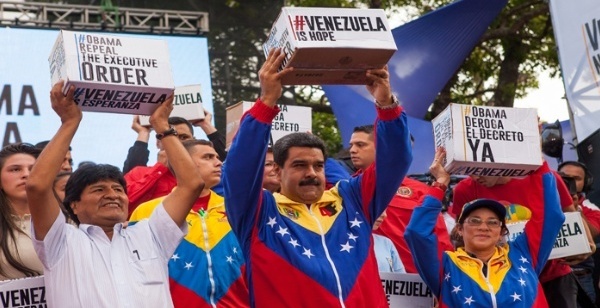
The petition campaign launched by Venezuela in response to the provocative and threatening March 9 sanctions and statement by U.S. President Barack Obama, designating Venezuela an "unusual and extraordinary threat to the national security and foreign policy of the United States," has exceeded its goal of 10 million signatures. Venezuelan President Nicolás Maduro brought 10.4 million signatures collected in Venezuela to the Summit on April 10. An additional three million signatures from around the world of those who support Venezuela's right to sovereignty were also brought to the Summit.
The signatures were gathered through mass actions in Venezuela, online, as well as through activities carried out by diplomatic missions and supporters of Venezuela around the world.
 In March, all 33 members of
the Community of Latin American and
Caribbean States (CELAC) expressed their opposition to the U.S.
government's move, with other regional bodies, including the United
Nations
of South America (UNASUR), doing likewise. Further afield, the
G77+China
group, comprising 134 countries, also issued a statement rejecting
President
Obama's executive order against Venezuela. Around the world, many
parliamentarians and international personalities have also spoken out
against
the U.S. decree.
In March, all 33 members of
the Community of Latin American and
Caribbean States (CELAC) expressed their opposition to the U.S.
government's move, with other regional bodies, including the United
Nations
of South America (UNASUR), doing likewise. Further afield, the
G77+China
group, comprising 134 countries, also issued a statement rejecting
President
Obama's executive order against Venezuela. Around the world, many
parliamentarians and international personalities have also spoken out
against
the U.S. decree.
Support for the rule of international law, the Venezuelan people's right to sovereignty and the democratically-elected government of President Nicolás Maduro across the Americas comes from all countries, except the U.S. and Canada. Both countries are promoting a spurious line against the Maduro government about human rights violations and state violence. This is being done to bolster the reactionary opposition forces that are carrying out economic warfare and terrorist activity so as to bring in a regime that is friendly toward U.S. imperialist interests in the region.
The April 3 remarks by U.S. Subsecretary for Latin America Roberta Jacobson at a conference at the Brooking Institution, in which she said she was 'disappointed' by the levels of support shown for Venezuela, indicate the isolation and desperation of the U.S. imperialists. "I am disappointed that there were not more countries to defend [the sanctions]. They were not made to harm Venezuelans or the Venezuelan government," Jacobson claimed. She tried to dismiss the principled support for Venezuela and the rule of international law and opposition to U.S. interference and hegemonistic aims in the region as "a lack of defence of democracy" and "an exercise of solidarity based on rhetoric." She then tried to portray the U.S. as the aggrieved party and not the instigator of a failed attempt to undermine the government of another country, saying, "The tone that Latin American leaders are using demonizes the United States as if it were the source of Venezuela's problems, and this makes it hard for us to proceed pragmatically."
(With files from TeleSUR, Latin American Herald Tribune)
Obama's About Face on Venezuela
U.S. President Barack Obama said on April 8 during his visit to Jamaica that Venezuela is not a threat to U.S. National Security, contrary to his March 9 presidential decree. This is a clear attempt to retroactively change his position following mass worldwide opposition to the decree.
However, he added that sanctions announced at that time are still in force and justified continued U.S.' hostility toward Venezuela with the spurious claim that the Venezuelan government keeps making efforts to intimidate its political adversaries. He now claims that the March 9 executive order was only ever aimed at countering human rights violations and corruption in Venezuela.
He said that the sanctions stipulated by the decree are not aimed at undermining the Venezuelan government or promoting instability. The sanctions only apply to those individuals the U.S. deems to have committed human rights violations or to be anti-democratic, he said. He gave the usual list of crimes the U.S. claims have been committed against its reactionary opposition forces.
Obama added that the U.S. will lobby other Latin American nations to "encourage the Venezuelan government to live up to its commitment to promote and defend democratic governance."
The White House began to backtrack earlier this week, when a top U.S. official stated the language of the executive order was "completely pro forma," TeleSUR reports.
However, the Obama administration has shown no signs of repealing the executive order and the sanctions it includes.
The Venezuelan government has made it clear that any action against Venezuelan citizens represents an action against the whole country.
Responding to the declaration, Venezuelan President Nicolás Maduro told state press agency AVN that Obama's about face represents a "triumph of the Venezuelan people and of the world support for [...] national sovereignty," referring to the large number of countries that have spoken out against the U.S. measure.
(Cuba News Agency, TeleSUR)
Overwhelming Support for Venezuela at
United Nations
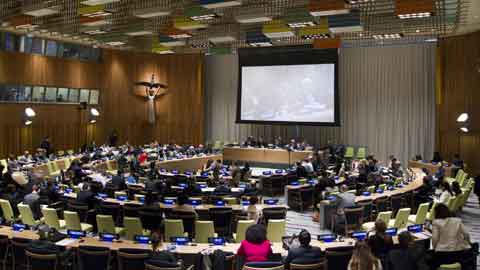
On April 2, in a lengthy session called Day of Solidarity with the People and Government of Venezuela, diplomats of several nations spoke out in the name of groupings and blocs, to demand that the U.S. open a dialogue with Venezuela to sort out their differences.
The first speech by Venezuelan ambassador to the UN Rafael Ramirez, was followed by presentations by the Community of Latin American and Caribbean States (CELAC), the Bolivarian Alliance for the Peoples of Our America-Trade Treaty of the Peoples (ALBA-TCP), the Union of South American Nations (UNASUR), the Group of 77 plus China and the Movement of Non-Aligned Countries.
All told, the interventions represented an overwhelming rejection of the March 9 executive decree of U.S. President Barack Obama, that spuriously claims Venezuela is a threat to the U.S.
Diplomats from Latin America and the Caribbean stressed their region's declaration that it is a zone of peace and advocates the peaceful solution of conflict, and that this is now being threatened by U.S. hostility. The region has changed and is now fully affirming its sovereignty and dignity, said the permanent representative of Ecuador to the UN Xavier Lasso, in the name of CELAC.
The Ambassador of Cuba to the UN Rodolfo Reyes stressed the firm position of ALBA-TCP to condemn Obama's decree and demanded that the U.S. respect the peoples' right to self-determination and non-interference in their internal affairs.
The Ambassador of Uruguay Gonzalo Koncke reiterated the stance of UNASUR, while the Iranian Chargé d'Affaires Hossein Dehghani reiterated the support of the 120-member nation Non-Aligned Movement for Venezuela. The Group of 77 plus China, a bloc of 134 countries, also reaffirmed its support for Venezuela.
Representatives of individual nations including Syria, Russia, Nicaragua, Iran, Zimbabwe, Sudan, Palestine, Cuba, Bolivia, Argentina and St. Vincent and the Grenadines, also expressed their solidarity with Venezuela.
Speaking with Prensa Latina, the Venezuelan Ambassador expressed appreciation for the international support and said that Venezuela gains great confidence from the strong solidarity it receives from Latin America, the Caribbean, Asia, Africa and other parts of the world.
(Prensa Latina)
Letter from World's Social Movements
to President Obama
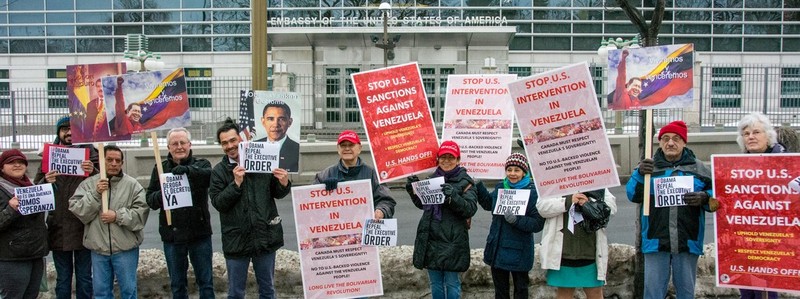
Picket at U.S. Embassy in Ottawa, March 26, 2015 demands Obama rescind executive order.
Dear Mr. President,
We, representatives from the social movements worldwide, have seen with bewilderment and indignation how on the 9th of March 2015 you decreed a national emergency in your country in order to confront Venezuela by labeling it as "an unusual and extraordinary threat to the national security and foreign policy of the United States."
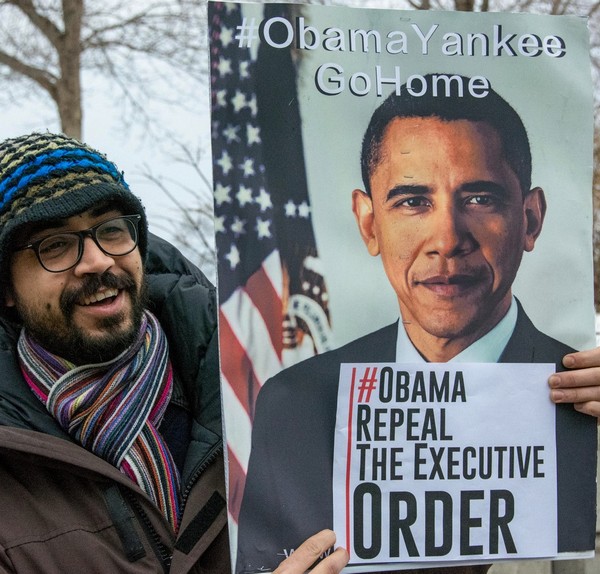 Such executive order is an
act of aggression which
violates international
law, and it is the most severe attempt to change the democratic will of
the
Venezuelan people.
Such executive order is an
act of aggression which
violates international
law, and it is the most severe attempt to change the democratic will of
the
Venezuelan people.
In addition, we believe that your executive order endangers peace throughout the continent, since it clearly implies that your Government is determined to roll back the social advances that have been achieved during the last decade in Latin America.
Mr. President, you are isolating your own country by turning it into a true rogue state.
You are treating Venezuela as an enemy, a country that over the last two centuries has cultivated a tradition of international peace.
You are acting as a world bully who wishes to forcibly impose his might over the rule of law and over people's sovereignty.
The military and economic power of the United States
shall never be
enough to tread on the rights of the rest of humanity.
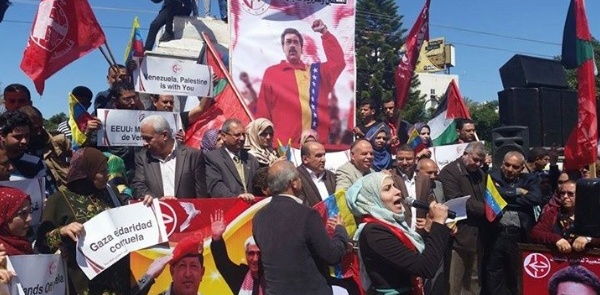
March 2015 demonstration in Gaza Palestine demands hands off Venezuela. (N. Harazeen)
Mr. President, you want to change the Government of Venezuela in order to upset the continent's progress in social policies.
The Government of the United States wants "to twist (the) arms" (of) Venezuelan men and women because they decided, peacefully and democratically, to correct the social inequalities accumulated over centuries of racism against indigenous and Afro-Latin Americans, of violence against women, oppression against rural and urban workers, discrimination against sexual minorities, exclusion of the minorities with special needs and environmental destruction.
Over the past 15 years,
millions of men and women in Venezuela, as well
as in Latin America and the Caribbean, have seen their quality of life
improve
thanks to the ongoing fight against poverty, illiteracy, lack of
medical
attention, and the recognition of their cultural, environmental and
sexual
rights.
This is due to a great historical change that has turned social movements into fundamental political actors, eroding the power of traditional elites.
Mr. President, you use the power of your country to privilege the powerful one percent which for centuries has oppressed the ninety-nine percent of the peoples in Latin America.
By trying to turn back the clock of Latin American history, your Government plots against democracy, popular majorities and the peace with justice that millions of us, Latin Americans, have built with so much sacrifice.
Venezuela is not alone.
In this struggle for peace and justice, the people of Venezuela have the right to freely decide their future. They even have the right to make their own mistakes.
We join Venezuela in its
liberation effort. The struggle of Venezuela's
majorities is our struggle. Their victories and defeats are ours.
Venezuela may well be unusual and extraordinary, but you Mr. President are the threat.
Mr. President, you seem to be convinced that Venezuela's defeat would create a "domino effect" all over the continent, halting the wave of social change that runs throughout the region. This error is born of your lack of understanding of Latin American social movements, which is also the case among the elites in your country. Your unjustified aggression is doomed to failure.
While Venezuela offers peace, solidarity and friendship to the people of the world, your Government only offers a return to the past through the illegal use of force, military bases, threats and intimidation.
For us the choice is clear: Venezuela may be unusual and extraordinary; however, you Mr. President and the US Government pose a real threat to democracy, peace and justice in Latin America.
We call for reflection, so that arrogance may cease. We call for respect for the human rights of people all over the world. Finally, we also call for the most active organization and mobilization of the world's ninety-nine percent to defend our social achievements and to advance our aspirations for peace and justice.
Therefore, Mr. President Obama, we demand that you repeal your executive order now!

Ottawa, March 11, 2015
Toronto
The Triumph of the People
Saturday, April 11 -- 6:00 pm
Beit Zatoun, 612 Markham St (Bathurst Subway Stn.)
Commemorating the Triumph of the Venezuelan People over the U.S.-manufactured
coup d’état attempt of 2002. The Bolivarian Republic of Venezuela continues
to defy imperialist forces despite attacks and massive pressure.
For information: www.venezuelasolidarity.ca
Edmonton
Public Meeting on Current Developments in Venezuela
Wednesday, April 15 -- 7:00 pm
Ukrainian Centre, 11018 - 97 Street
Speaker: Ms. Merli M. Vanegas, General Consul of the Bolivarian Republic
of Venezuela's Consulate in Vancouver
For information: Ukrainian Centre, 780-424-2037
Ottawa
Obama, Repeal the Executive Order!
Sunday, April 19 -- 2:00 - 3:00 pm
U.S. Embassy, Mackenzie St. (Outside Major's Hill Park)
For information: Facebook
Read The Marxist-Leninist Daily
Website: www.cpcml.ca
Email: editor@cpcml.ca
